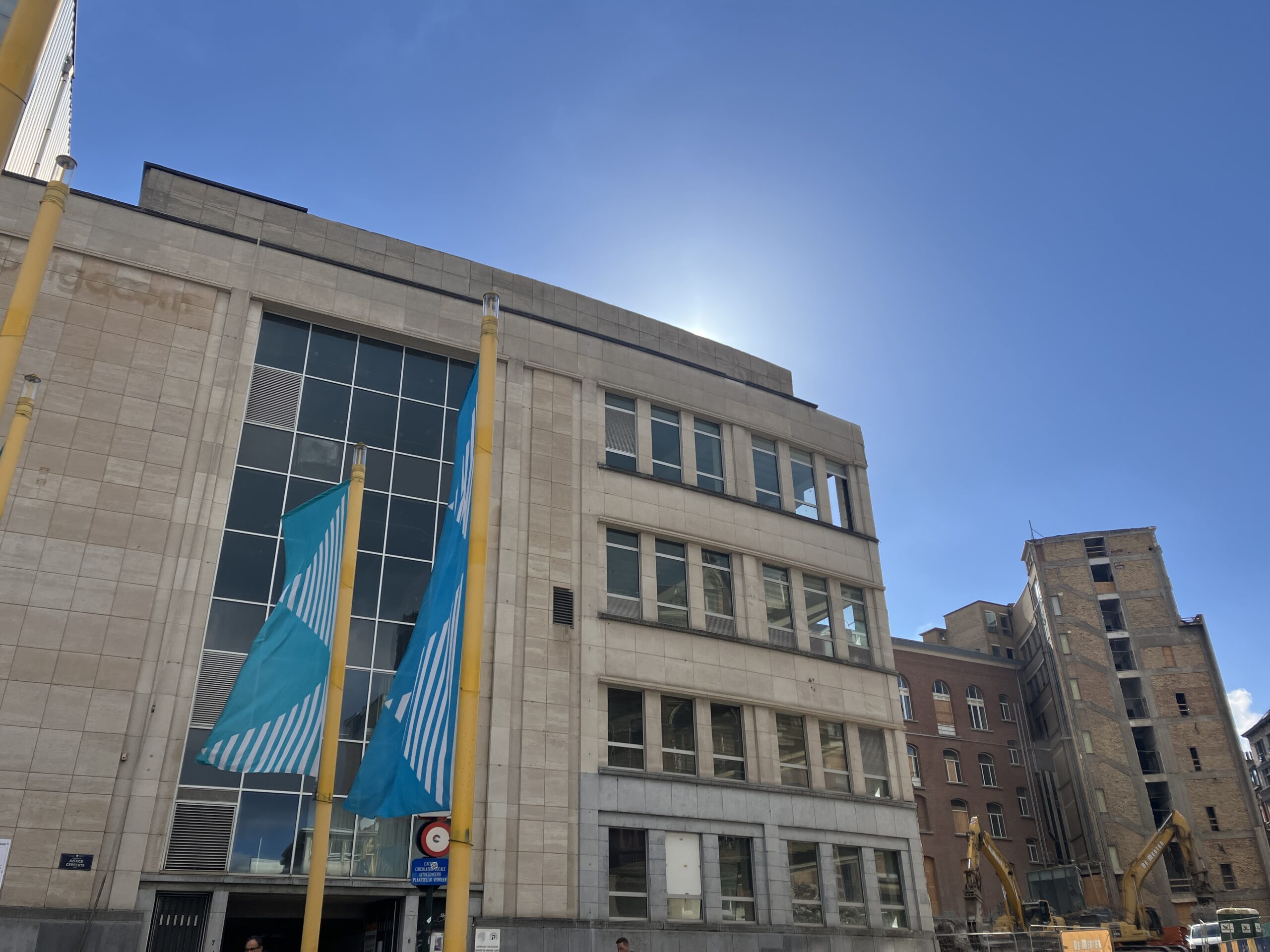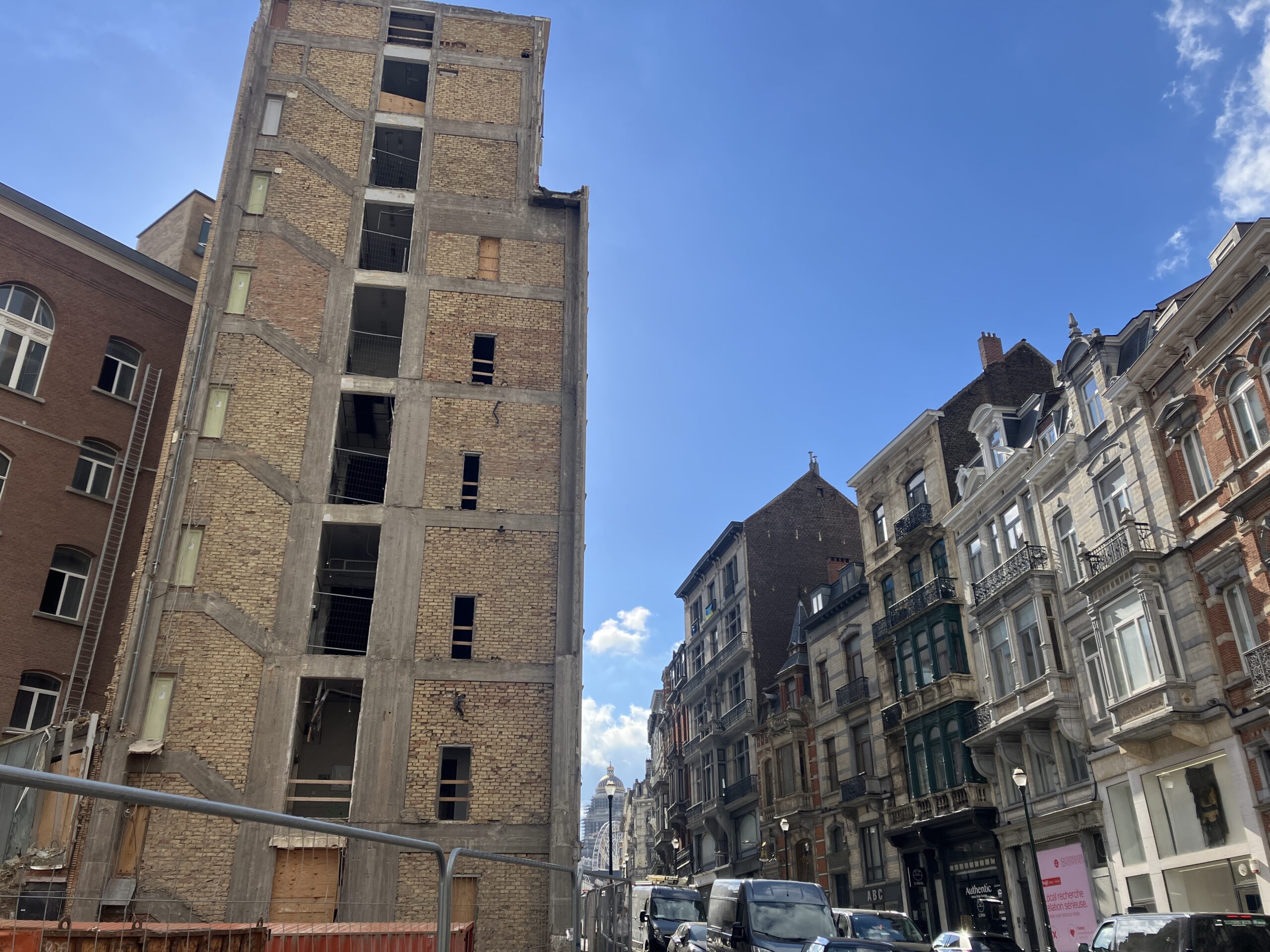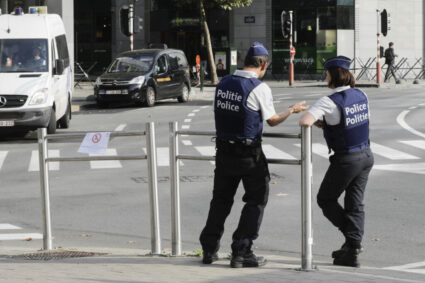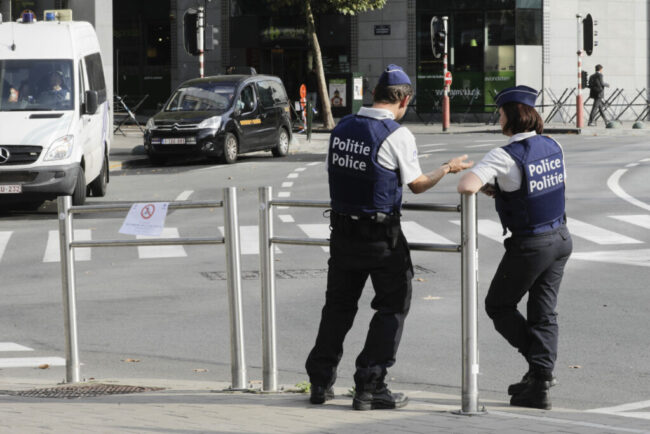An abandoned building at the heart of the Sablon district has become the centre of a heated debate as locals contest renovation plans. The vision that some had hoped would rejuvenate the area; others bitterly opposed – a standoff that could see the building left empty for much longer.
The former Belgacom offices on the iconic Rue Lebeau have been unoccupied since 2019. The site was consequently chosen for a major Immobel-led project to transform the monotonous 1960s building into a modern space with housing, offices and shops, dubbed Lebeau. However, initial plans have gone down badly with locals.
“We as a neighbourhood felt the first plans were too drastic. Around 3,000 to 4,000 people voiced concerns, stating we opposed the project during the public enquiry,” antique dealer (Artimo Fine Arts Gallery), Georges Van Cauwenbergh, told The Brussels Times. “We eventually blocked the giant project.” The authorities asked construction promoter Immobel to modify key parts of the project.
A smaller surface would be demolished, the underground car park would be limited to two levels, the planned 22-storey hotel tower was dropped, and the number of flats was cut by more than a third. Finally, after two failed attempts, Immobel’s proposal was given the green light by the Brussels Region in February this year.
While some early critics, including Van Cauwenbergh, later favoured the revised project, other local and urban organisations took the project to the Council of State, igniting a local quarrel.
A ‘scandalous’ hold-up
The Sauve Lebeau committee, together with the Association Patrimoine Artistique, some residents and Inter-Environnement Bruxelles (IEB), lodged an appeal for suspension as a matter of extreme urgency, giving the court just days to issue its verdict. In the meantime, Immobel had already started demolishing part of the building.
“This was not illegal, but from an ethical point of view it’s problematic,” IEB’s Thyl Van Gyzegem told The Brussels Times. “The Council of State could only conclude that there was nothing left to protect”, and the group lost this case. However, it also launched an appeal to cancel the project’s permit.

The iconic former Belgacom building. Part of the facade will not be demolished. Credit: Lauren Walker
This appeal is the main point of contention for a group of 25 residents and shopkeepers, as Immobel doesn’t intend to start rebuilding with the case pending. They have written an open letter in favour of the renovation, denouncing what they say is a hold-up created by the appeal. The group has circulated petitions calling for support and has taken legal action, filing an intervention with the Council of State.
“The project is now blocked, potentially for several more years. It is scandalous,” Van Cauwenbergh said. “We initially agreed that the project was excessive, and when the changes were made, we felt satisfied. Now we just want renovation works to get underway.”
He added that there is no reason to stop the project as it stands today. ” We think it is ridiculous that a relatively small group can block this vital opportunity to rejuvenate Sablon, especially as some of those opposing it don’t even live here and people who do work or live here and are defending the interests of Sablon are in favour.”
‘Not meeting needs’
The counter-movement lodging the appeal is supported by 300 people (mostly locals). They contest plans for the building to be four storeys higher than the opposite buildings. “If a building is demolished and rebuilt, the developer must take the surrounding area into account and build something that is in keeping with the surrounding properties, not to add additional storeys that tower over them,” Van Gyzegem said.
To him, the project on the table now is not much different from the original. “I don’t understand why so many of those who were initially opposed are now in favour. I know the developer is trying to negotiate individually with the residents, as they also tried to negotiate with us to drop the appeal.” Some locals said other residents put pressure on them to change sides.

The demolition works on the parts of the building that will not be protected have already started. Credit: Lauren Walker
But it isn’t just the building’s height that is problematic, the IEB wants to represent the interests of the whole region, not just on a local level. “We vouch for renovation over demolition and rebuilding, which has a large-scale environmental impact,” Van Gyzegem said. “If we build a car park, this supports the presence of cars in the region, which harms air quality.”
In short, IEB wants to defend the region’s needs, not just those of the Sablon neighbourhood. “We need affordable housing but Immobel is only providing private, top-of-the-range homes. We need public facilities, schools, nurseries, and cultural facilities, but that’s not what the project is about either. Instead, it will create more office space at a time when there is 1 million m2 of office space empty (in Brussels). The project does not correspond to the real needs of Brussels today.”
Setting a precedent
Van Gyzegem contested that the blockage of works referred to by Van Cauwenbergh was due to the appeal, as the court did not order a suspension of the works, meaning there is no legal obstacle to continuing the project.
“If Immobel is afraid that the permit will be invalidated at the end of the procedure (and even if that happens, we know that the Region will draw up a new permit to regularise matters), it should not have started the demolition work,” said Van Gyzegem. “Residents, whether for or against the project, are now suffering the consequences.”
With the case at the Council of State, IEB takes aim at the decision by public authorities to allow projects that focus only on making a profit, and wants to set a judicial precedent for future projects of a similar nature. “If legislation isn’t respected by a developer who is asking for a whole raft of exemptions for their project, the public authorities should not accept this. If this ruling on the permit goes our way, it sets an example that developers have to abide by the legislation, and gives us leverage to appeal.”
Senior Developer at Immobel, Marc Poncelet, responded that the project for which it obtained planning permission fully complies with legal requirements. He said that the “demolition works have begun, in full compliance with the building permit”.
Immobel also disputes the allegations that it used questionable tactics to win over locals. “Throughout the many years of consultations, we have always been transparent and constantly sought dialogue with all parties involved.”














